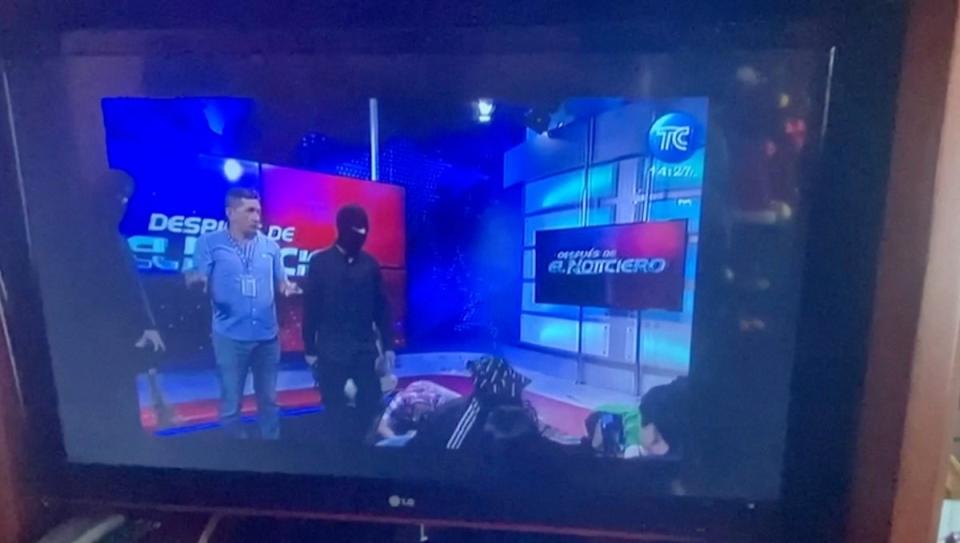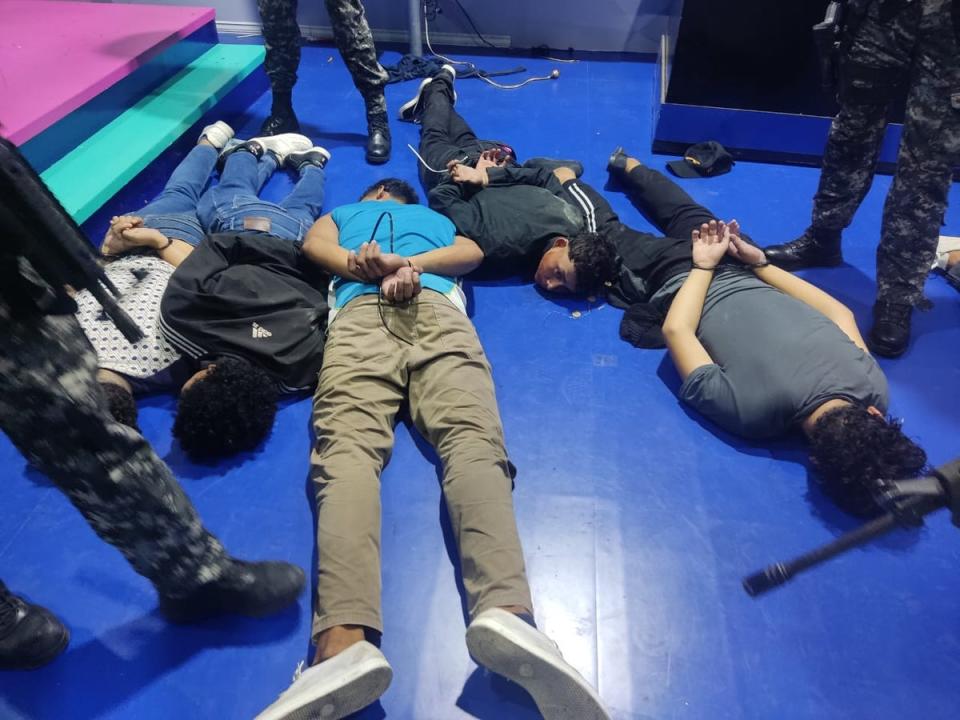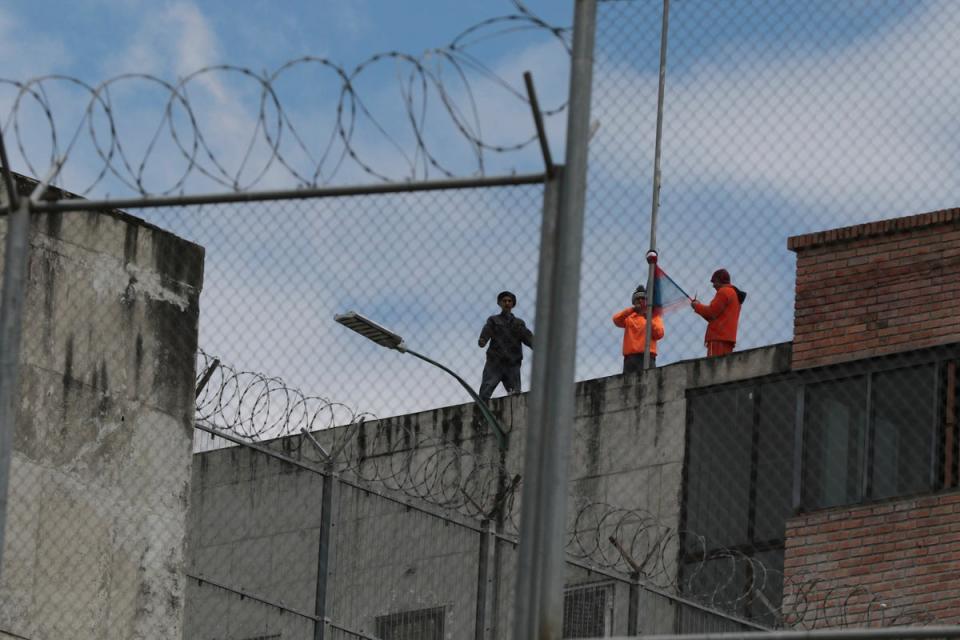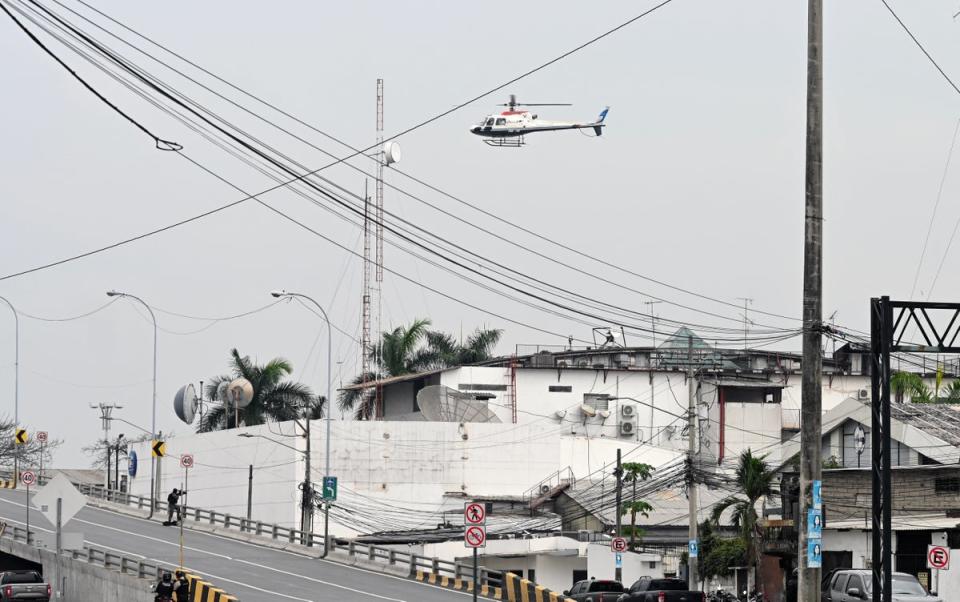Gunmen storm TV station in Ecuador live on air after state of emergency declared
- Oops!Something went wrong.Please try again later.
Armed militia stormed a television studio during a live broadcast in Ecuador carrying shotguns, pistols, and homemade bombs, after the country’s president issued a decree declaring 22 gangs as terrorist organisations.
Police arrested 13 gunmen who took over television station TC in the city of Guayaquil during a live broadcast on Tuesday, forcing staff onto the floor in footage beamed to thousands of homes.
The channel, which was back on-air for its evening news broadcast, said two employees were injured in the incident.
The terrified host was seen praying to the camera as a shotgun was held to his head, while other attackers showed off grenades and sticks of dynamite to the audience. The group shouted that they had bombs as what sounded like gunshots were heard in the background.

The newspaper El Universo said reporters on the interrupted El noticiero news programme messaged groups begging for help. One read: “They want to kill the lot of us. Help us.” The channel broadcast live for at least 15 minutes before the signal was cut off. During the transmission, someone was heard yelling: “Don’t shoot!”
Alina Manrique, the head of news for TC Television, said she was in the control room, across from the studio, when the group of masked men entered the building. One of the men pointed a gun at her head and told her to get on the floor, Manrique said.
“I am still in shock,” Manrique said in a phone interview. “Everything has collapsed .... All I know is that it’s time to leave this country and go very far away.”

Some of the assailants ran from the studio and tried to hide elsewhere in the building when they realised they were surrounded by the police, she said.
Half an hour after the gang stormed onto the set, police entered the building and later announced a number of arrests had been made. Police in Guayaquil confirmed 13 arrests and social media posts showed photos of young men lying on the floor with their hands zip-tied behind their backs.
Ecuador Police said on Twitter/X they had managed to release the hostages. Local media outlets have also reported armed factions entering the Maldonado Hospital and the University of Guayaquil.

The incident followed the kidnappings of at least seven police officers and a series of explosions, a day after president Daniel Noboa declared a state of emergency.
Mr Noboa issued a 60-day state of emergency on Monday, after a convicted gang leader disappeared from his prison cell, giving authorities the ability to suspend rights and mobilise the military in places like prisons.
In the southern city of Machala, Quito, and Los Rios seven police officers were kidnapped in three separate incidents. Three officers taken in Machala were later freed and 10 arrests were made, the police said.
Explosions were reported in Esmeraldas and Los Rios as the attorney general’s office said it was investigating one in Guayaquil. No one has claimed responsibility for the explosions so far.
The crisis developed after the leader of Los Choneros gang Adolfo Macías, known as “Fito”, vanished from his cell, with authorities unable to find him or explain his disappearance. Ecuador’s prosecutors office tweeted on Monday that it had filed charges against two prison guards as part of the investigation into the case which it is considering a “prisoner’s escape”.

Los Choneros is one of the Ecuadorian gangs considered by authorities as responsible for a spike in violence over the past years that reached a new level last year with the assassination of the presidential candidate Fernando Villavicencio. The gang has links with Mexico’s Sinaloa cartel, according to authorities.
The politician had said that the criminal group led by Fito threatened him, but so far authorities haven’t directly accused Macías or his group of being behind Villavicencio’s murder.
Los Choneros and other similar groups linked to Mexican and Colombian cartels are fighting over drug trafficking routes and control of territory, including from within detention facilities, where at least 400 inmates have died since 2021, according to authorities.
Experts have acknowledged that gang members practically rule from inside the prisons, and Macías is believed to have kept controlling his group from within the detention facility.
President Noboa, an heir to a fortune built on the banana trade, took over in November saying his government’s main objective is to reduce violence.
His administration said the violence was a reaction to the president’s plan to build a new high-security prison and transfer jailed gang leaders.
“Today’s events show that the actions and decisions taken by the national government are gravely affecting criminal structures, and as an answer they have created a wave of violence to frighten the populace,” Admiral Jaime Vela, head of the joint command of the armed forces, said after a security meeting with the president.
The US condemned Tuesday's "brazen attacks", saying Washington was closely coordinating with president Noboa and stands ready to assist. Brazil, Colombia and Chile in the neighbourhood extended their support for the Ecuadorian government.
Ecuador’s domestic crisis prompted Peru's government to declare an emergency in the north along its border with Ecuador.
The Chinese embassy and consulates general in Ecuador announced a temporary closure from 10 January until further notice.

